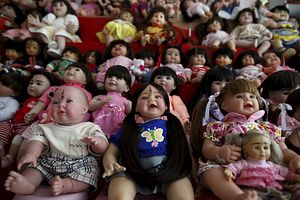For many Thais, baby-sized plastic dolls are more than cute companions.
Luuk Thep, translated to “child angels,” are “supernatural” Thai dolls that are treated like real children by their owners. For a while this year, the trend created a buzz on social media. Owners were spotted taking their dolls to restaurants, attending religious ceremonies, and even flying on planes with them. The lifelike dolls, which sell for 1,500 to 30,000 baht ($40 to $800), are believed by some to have a soul, and to bring good fortune and wealth.
Despite a long history of doll fanatacism in Thailand, the practice became a fad only recently when Thai celebrities started parading them around on airplanes or other forms of public transportation.
Some doll owners contend that their life has been positively transformed after purchasing the doll. Among them is radio host Thanatchapan “DJ Pukko” Booranachewawilai, who attributes his career success to his luuk thep, which he affectionately calls “my son Wansai.”
“The first day I got him, I took him out shopping for clothes in the baby section,” he said. “Right after I paid for his clothes, I got a call that my canceled job was back on!” he was quoted in an online article.
Thannatchayapan has now included the doll in his family portraits.
Superstitious Society
Although Thailand is modernizing at a rapid rate, many people still hold strong superstitious beliefs. Buddhist precepts coexist with ideas of animism, astrology and black magic. And at a time of economic turbulence, locals flocked to shops to purchase the dolls in the hope that they will reap good luck.
Panpimon Wipulakorn, deputy director-general of the Department of Mental Health said that the slump in the economy exacerbated the doll fad. “There have always been groups in Thai society that hold such beliefs and economic worries only help to heighten these beliefs,” Panpimon was quoted as saying by Reuters.
Thailand has seen similar fads in the past. One such frenzy was in 2006, which brought a boom in Jatukham Ramathep amulets supposed to bring wealth.
Thai Airlines
Local airlines cashed in on the doll craze by allowing adults to buy seats for their dolls. Thai Smile, a subsidiary of national flag carrier Thai Airways, began charging passengers who bring dolls into the cabin, give them regular passenger seats and serving them real food. Even bus operators joined the bandwagon. A state-owned bus operator, Transport Co is charging half-priced tickets for the dolls, with the cost including food and beverages.
However, the Civil Aviation Authority of Thailand expressed concern that smugglers were using the dolls to bring in drugs. In one case, the police discovered 200 methamphetamine pills inside a “child angel” in the carpark area of Chiang Mai International Airport after receiving a tipoff. Citing security concerns, the authority said it would stop airlines from selling tickets for the dolls.
For the rest of the world, the growing mania for “angel dolls” may seem a strange obsession. However, Dr. Jesada Chokedamrongsuk, director-general of the Mental Health Department, insists that the obsession is not a mental illness but simply a matter of personal belief.
Roshni Kapur is an independent journalist based in Singapore.

































